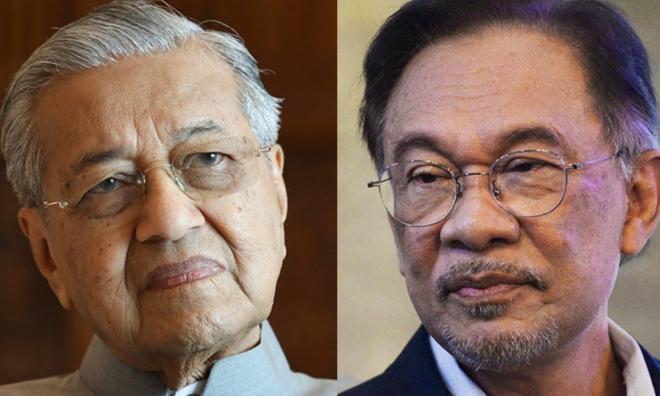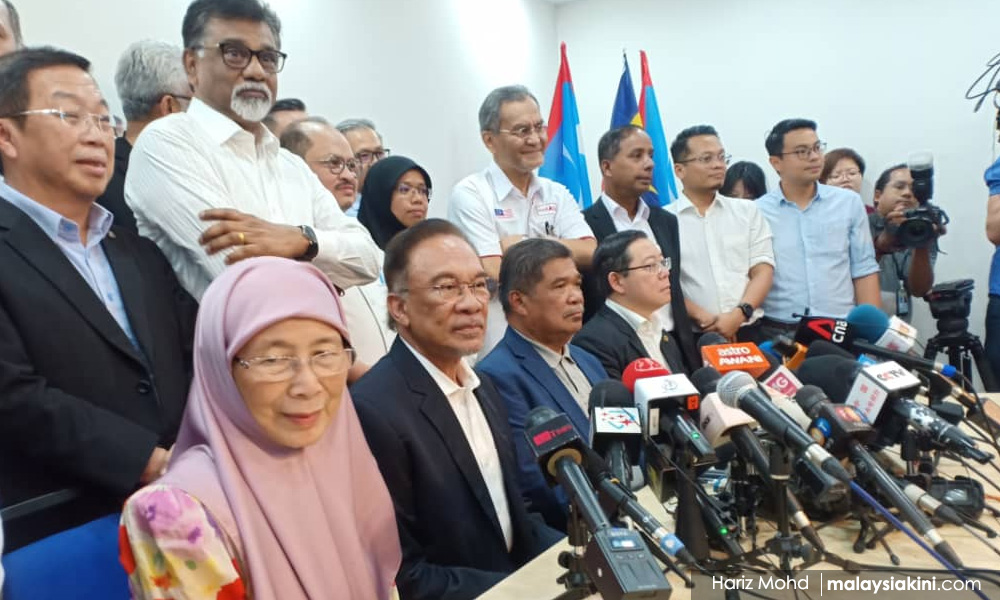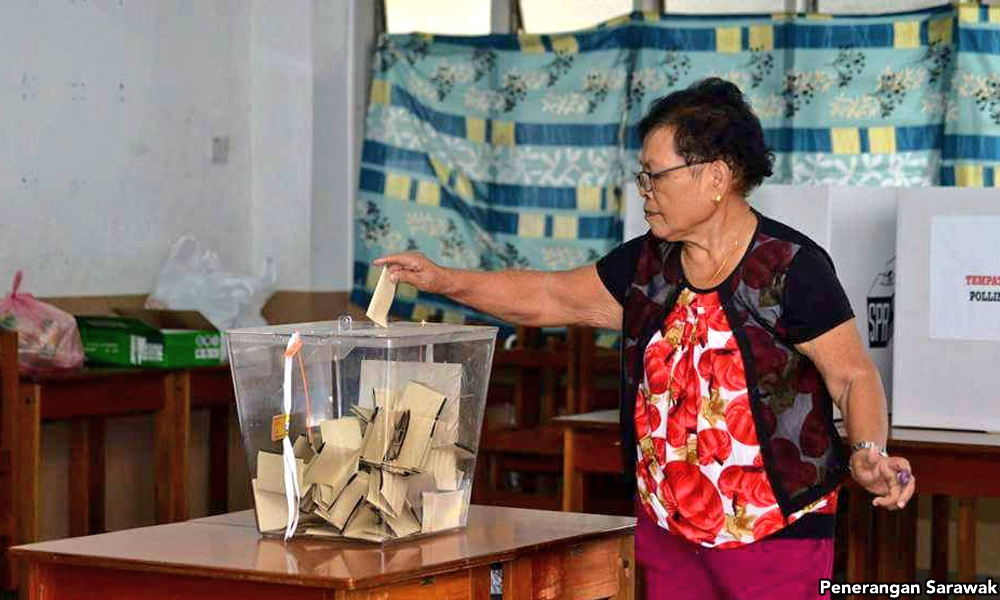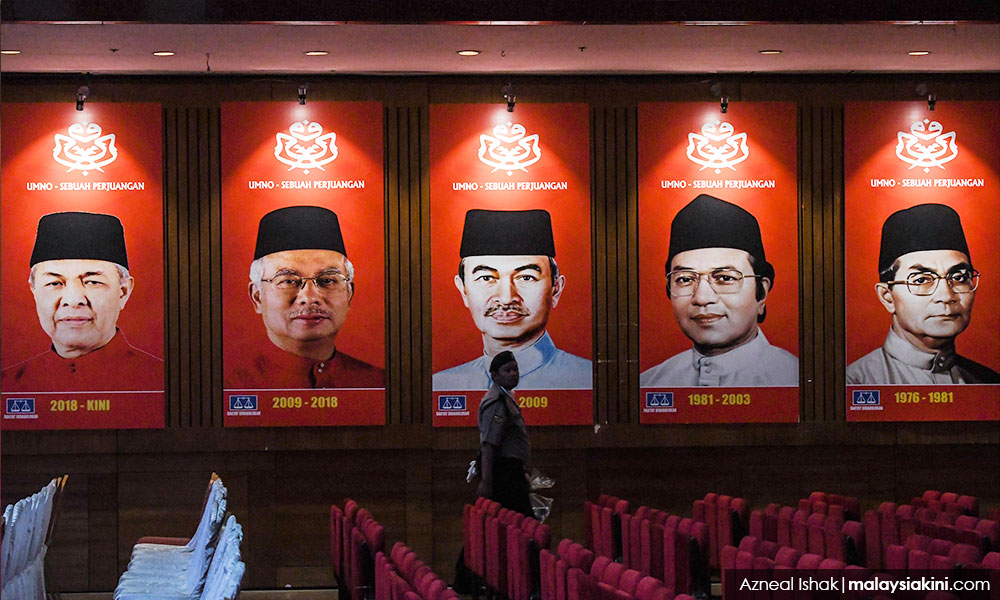
After a day where the political showdown between interim Prime Minister Dr Mahathir Mohamad and PKR leader Anwar Ibrahim over Malaysia’s future came starkly into the open with both men holding press conferences stating different visions for government and leadership, the Agong faces what can be seen as the country’s prisoner’s dilemma.
A "prisoner’s dilemma" is a situation where two individuals acting in their own self-interests do not produce the optimal outcome. Both men – Mahathir and Anwar - think they are right in "saving the nation" and "saving democracy and the people’s mandate". They believe they are doing the right thing for the country, but, sadly, those being held prisoner in this situation are the Malaysian people.
Let’s look carefully at the main three options ahead, recognising that the political situation in Malaysia is rapidly evolving and even as I write this the options laid out below may be moot or changed.
Option 1: Mahathir’s 'disunity' government
Giving himself full decision-making powers, this option allows Mahathir to pick and choose the cabinet as he wants, including individuals outside of political parties. I call it the "disunity" option because it was provoked and could provoke disunity.
Besides the obvious issue that this option narrows and centralises decision making around one person – a risk in any political system as there are fewer checks and balances – there are three other challenges.
First, this was not the mandate that voters elected in GE14. They did not exclusively elect the leader, they elected the coalition, the political parties, and for some, they voted on the premise of an agreement of a leadership transition to Anwar. Mahathir was not elected for this type of government.
Second is what I term the "triple opposition". Civil society groups have already come out to oppose this undemocratic move. Mahathir does not command broad political support at this juncture. He arguably went into this week before the political turmoil at the lowest popularity in his political career as support for his leadership has been ebbing, and while it is not fully clear how the public will view these recent events, Mahathir himself has already accepted some responsibility for the ongoing instability in his apology.
Beyond public opposition, those in Pakatan Harapan and their supporters will oppose this move, pointing to further perceived "betrayal" of promises on the part of Mahathir. Not to be left out, Umno (and to a lesser extent PAS who has expressed more loyalty towards Mahathir) will not support this option as they are more confident that going to polls will secure them a return to power. (Do note that some individuals in Umno could do so, splitting or reconfiguring the party, but let’s see how this evolves.)
Finally, the third issue is one of capacity. Can he govern? At 94, Mahathir’s age has been a liability in terms of investment and political uncertainty. After 20 months in government, he has not outlined an economic plan and continues to hold onto legacy projects like the national car and endorse non-competitive economic practices that allow for cronyism and persistent patronage.
Mahathir has wrestled with a civil service, which has been resistant to change. Policy implementation has been a real problem. The issue of who will he bring in – their backgrounds politically (the defectors? party affiliations) and economically (business links) will be scrutinised and shape effectiveness – as any "disunity" government will face serious obstacles.
Option 2: Anwar’s minority government
With the remaining core of Harapan professing loyalty to Anwar and showing trust among each other, an Anwar-led minority government would be unified around leadership. Without Bersatu, it would share greater common ideals toward reform, as most of the remaining members have long been part of the reformasi struggle.

A Harapan (minus Bersatu) minority government would face three immediate challenges. Foremost would be to pass a vote of no confidence in Parliament when it opens the second week of March. It would need the numbers among parliamentarians and, for now it seems, they have yet to secure the numbers for a majority. The East Malaysian parties would become even more important in setting the direction for political viability.
Second, is the question of ethnic "Malay" legitimacy, a perennial issue in Malaysia’s highly ethnicised context. With only a little over a third Malay MPs, a minority government could be labelled an "ethnic minority" government and feed into the persistent and sour racial politics of the county. The negativity directed towards DAP within Harapan – deeply demonised and lacking support among most Malays – is a hurdle in winning over Malaysia’s ethnic majority.
Finally, is the issue of rebuilding legitimacy. If selected, an Anwar-led Harapan minority government would come into government with the baggage of having Mahathir’s leadership as the first Harapan government. Thus it will face the challenge of distancing itself from the earlier Harapan government’s weaknesses in delivery and slow reforms, while at the same time grappling with the fact that they were in fact part of that government and responsible for the decisions and outcomes of the first Harapan government. They too will face the issue of civil service support.
To top this off, an Anwar-led Harapan would have to differentiate itself from its earlier Harapan government to adequately win support in parliament, facing challenging choices in terms of appointing positions in a cabinet and clearly demarking how its priorities and programmes are different than those in the past, which were not fully effectively communicated and delivered.
Claiming it is the "true" representative of the "manifesto" – a document widely seen as containing many ideas that are not implementable and many more that have not been implemented will not help Harapan win support.
Option 3: New elections
Elections are the most democratic option, although they do not necessarily promote stability or lead to inclusive outcomes.
Malaysia’s first-past-the-post electoral system reinforces a "zero sum" winner versus loser context, in which the opposition has been excluded and political polarisation fostered.

Problems remain in the fairness of the electoral process, as electoral reforms – with the exception of lowering the voting age – have yet to be properly implemented, although the professionalism of electoral administration on the part of the Electoral Commission has significantly improved.
Here too, there are three notable challenges with snap elections, that go beyond the existing issues in the electoral process.
Foremost, all political parties are weaker. The coalition process has especially weakened Harapan, as many of the parties and leaders have been delegitimised among some of the public. Harapan is largely comprised of issue-based (as opposed to grassroots parties) and as the former government, their advantage on issues has diminished. They no longer can criticise in the same way as they held power in their hands.
For Umno and PAS (with greater grassroots), they lack resources and credible national leadership. As such, these parties will primarily adopt a criticising-issues mode to mobilise. If elections are called, expect an attacking campaign.
Second, for all sides of the political divide, identity politics will permeate. Following the post-GE14 environment, there has been a heightened use of race and religion (in a context where this is already high). This sort of negative campaigning has the potential to further fray the country’s social fabric.
The question of who protects and represents the Malay majority and non-Malay minorities remains a pressing concern mobilised directly and indirectly by political parties. In East Malaysia, state nationalism continues to be the dominant messaging. Contending dreams for Malaysia as a nation will be at stake with differences over representation and inclusion.
Third, is the issue of reform - arguably the main driver of calls for electoral change in Malaysian politics for nearly two decades. The composition and direction for reform are less clear as there have been contradictory responses on governance and increased democratic openness. No question, with Umno out of office and desperate to return to power, there will be highly mobilised interests fostering resistance to any further changes.

Finding the positivity will be difficult - a real challenge to mobilise hope with the dominant mode "against" others rather than for the nation. Keep in mind, many Malaysians are fed up with their political leaders – across the political parties. This political turmoil has severely damaged trust for political leaders.
Any new elections - GE15 - will result in Malaysians continuing to look inward, and the outcome may not be what many of the political actors want. There is no guarantee that the outcomes will lead to political resolution among the actors, and, importantly, turn leaders away from politics to governing the country, to solving the challenges facing the Malaysian people.
These three options are indeed less than ideal, especially as Malaysia faces greater global and regional economic insecurity. Ordinary Malaysians and many businesses are struggling in these uncertain times. There is a growing sense of feeling trapped – imprisoned – by the constraints of the political options ahead.
The possibility of new options – a different led unity government, a compromise among the key current contenders or new alliances – remain in the realm of the possible, as recent events show that in Malaysia anything is possible. As Malaysians wait for its leaders to consult, reason and reflect, the dilemma of how to resolve the country’s leadership continues to entrap (but not enthral) Malaysians.
BRIDGET WELSH is a Senior Research Associate at the Hu Feng Centre for East Asia Democratic Studies, a Senior Associate Fellow of The Habibie Centre, and a University Fellow of Charles Darwin University. She recently became an Honorary Research Associate of the University of Nottingham, Malaysia's Asia Research Institute (Unari) based in Kuala Lumpur. - Mkini
No comments:
Post a Comment
Note: Only a member of this blog may post a comment.